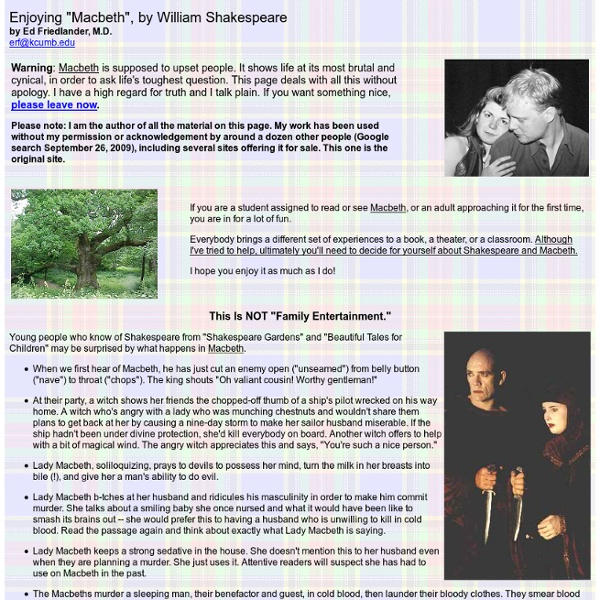Absolute Shakespeare - plays, quotes, summaries, essays...
Essential knowledge and literary terms for understanding Shakespeare. An Award winning
You - you- your- your formal and distant form of address suggesting respect for a superior or courtesy to a social equal. Thou - thee - thy - thine informal and close form and can imply either closeness or contempt. Gertrude: Hamlet, thou hast thy father much offended. Hamlet: Mother, you have my father much offended. Gertrude: Come, come, you answer with an idle tongue. "Ye/you" or "thou/thee" sometimes show social classes, too. Falstaff: Dost thou hear, hostess? It can be insulting if it was used by an inferior to address a superior social rank.
Shakespeare Navigators
Open Source Shakespeare: search Shakespeare's works, read the texts
ENGL 339 Home Page
English 339: Introduction to ShakespeareFall, 2013 Site Navigation PREREQUISITES: GE area A (esp. expository writing, e.g. A WRITING-INTENSIVE, G.E. GWR: As a C4 literature class, ENGL 339 may be taken by students wishing to fulfill the Graduate Writing Requirement (GWR). ENGL 339 is designed to introduce both English or Theatre majors and G.E. students to representative plays of all genres by William Shakespeare, perhaps the finest poet ever to write in English. REQUIRED TEXTS: The SIGNET CLASSICS editions of A Midsummer Night's Dream; Henry V; Macbeth; Hamlet; and The Tempest. NOTE: As You Like It has been dropped from the class this quarter due to the necessity of scheduling a video screening of a film available only on VHS during class time. Other required readings will be accessed electronically: Online Readings are found in .HTML files accessible through links on this website and E-reserve readings in the form of .PDF files on "electronic reserve" in PolyLearn.
Improve Your Pronunciation
One of the most important aspects of learning English is pronunciation. Without clear pronunciation, it is difficult to make yourself understood. However, you might be surprised by the following statement: Pronouncing every word correctly leads to poor pronunciation! Good pronunciation comes from stressing the right words - this is because English is a time-stressed language. Difficulty: Hard Time Required: Varies Here's How: Learn the following rules concerning pronunciation. Tips: Remember that non-stressed words and syllables are often 'swallowed' in English.
Romeo & Juliet
Using this Guide List of other study guides The notes were prepared for use with an edition of Romeo and Juliet bound together with the book for West Side Story and in conjunction with a showing of Franco Zeffirelli's film version of the play, but they will be useful with any edition or production. The introduction focuses primarily on comparisons with West Side Story, so it has relatively little to say about the play as such. As noted, this is often regarded as a lesser Shakespeare tragedy by scholars, but what should also be kept in mind is that audiences have made it one of the most beloved plays of all time from the Elizabethan Age to the present. Romeo and Juliet are often considered the archetypal lovers, and at one time "a romeo"--meaning a lover--was a common noun. Although Shakespeare's dialogue often reads beautifully enough on the page, please keep in mind that he never intended his words to be read. Shakespeare wrote almost no original plots. Prologue Act I: Scene 1
Newspaper Headlines for English Learners
Take a look at any newspaper or magazine headline and you are likely to find incomplete sentences full of action packed verbs. Headlines live in a linguistic bubble all by themselves because they ignore grammar conventions such as the use of helping verbs and so on. Of course, this means that newspaper headlines can be confusing to students. This is because newspaper headlines are often incomplete. Difficult Times Ahead Under Pressure from Boss Mustang Referral Customer Complaint This lesson focuses on helping make sense of the strange forms used in newspaper headlines. Aim: Understanding newspaper headlines Activity: "Translating" newspaper headlines into more understandable English Level: Intermediate to higher levels Outline: Find some headlines in old newspapers or on the Internet and cut them out. Newspaper Headlines Worksheet 1. Categories Newspaper Headlines 2.
Romeo: courtly lover
Courtly lover and madman Commentary Table of Contents | Next page On this page: Introduction Partly because you will be thoroughly familiar with the main line of the plot of Romeo and Juliet, I am going to start my discussion of the play by beating about the bush: I will ask you to look at Romeo before he meets Juliet; at the brilliant but eccentric speech of Mercutio on Queen Mab; at Romeo and Juliet as tragedy; and at some of the many colourful minor characters in the play--then to look again at Romeo and Juliet themselves. Look with some care at the dialogue between Benvolio and Romeo, 1. 1. lines 163-241. Look especially at the near-comic juxtaposition of ideas in lines 174-8, just before Romeo's first apostrophe to Love. Look ahead to the next scene with Romeo (still before he has met Juliet), 1. 2, particularly lines 91-6 where he speaks again in response to Benvolio. Think of Orlando in the first three acts of As You Like It, even perhaps Claudio in Much Ado About Nothing.
Pronunciation of macbeth - how to pronounce macbeth correctly.
This site uses Copyright © Tim Bowyer 2006-14 • All rights reserved U.S. Patent No. 20040162719 • Howjsay in: Deutsch • Français • Italiano • Español • Requests, Errata etc. This site uses Copyright © Tim Bowyer 2006-14 • All rights reserved U.S.



